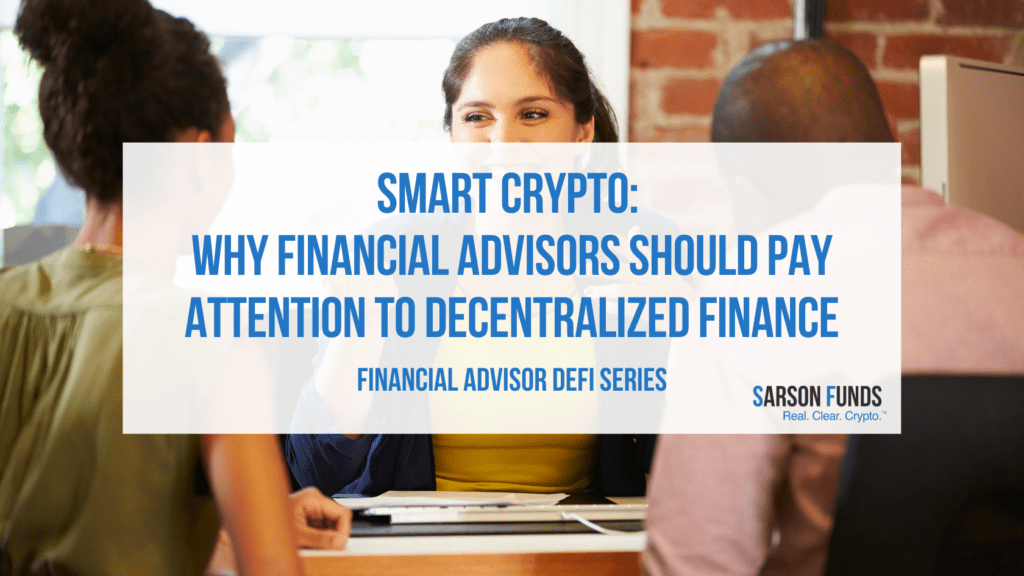
In this segment of the Financial Advisor DeFi Series, we will be focusing on a critical question: Why should financial advisors pay attention to decentralized finance (DeFi)? For generations, the public has looked towards financial advisors, planners, wealth and asset managers to be stewards in the growth of their wealth. Money is often an individual’s most valued asset, and we believe the evolution of money should be treated with the utmost attention.
DeFi replaces traditional investment practices by removing inefficient third parties with algorithms, and we expect this trend to continue. These DeFi strategies offer cutting-edge approaches to portfolio diversification and potential asset growth, with some providing yearly returns that take many traditional investments years to achieve. In this article, we will introduce and discuss some popular yield-generating solutions that digital asset markets provide, including liquidity provision, decentralized lending and borrowing, staking, and two protocols we believe are important for financial professionals to understand.
For an in-depth overview of DeFi, please check out our DeFi white paper, DeFi Demystified: The Investor Guide to Decentralized Finance.
Portfolio Management Opportunities
When looking to understand the crypto ecosystem from an investment perspective, it is important to pinpoint opportunities that foster asset growth. Many traditional approaches to wealth management achieve gains as a result of investing, selling, investing again, then selling again. However, as crypto creates new yield-generating opportunities and the great wealth transfer looms, we believe it will be advantageous for financial advisors to prepare to advise their clients on the different ways they can generate yield from their crypto assets. Below, we list a few.
Liquidity Provision, Decentralized Lending and Borrowing, and Some Leaders
Liquidity Provision – AKA Yield Farming
Let’s add some color. Decentralized exchanges (DEXs) rely on liquidity provision from crypto holders to support 24/7 trading and automatic fulfillment of purchase and sell orders. DEX liquidity is supported by automated market makers (AMMs) to fill user orders, while AMMs rely on liquidity providers – you and me – to contribute the liquidity needed to support traders large and small. These liquidity providers (LPs) pool their tokens based on token trading pairs (ie. BTC-ETH, ETH-USDC, etc.) and are rewarded with the trading fees incurred proportionate to their size of the pool. Each time a token pair is traded, these LPs generate yield. When LPs want to remove their tokens from liquidity pools, they simply trade in their LP tokens (token given to LPs similar to an IOU that indicates their share of a liquidity pool) and receive their original percentage of the pool in return.
Liquidity provision, AKA yield farming, is one avenue DeFi provides to earn passive income on crypto assets, often providing stable, low-risk yields to farmers. When providing liquidity, traders should always be weary of impermanent loss risk, which you can learn more about here.
One of the leading AMMs and largest DeFi protocols is Aave, which allows anyone to provide liquidity across hundreds of token pairs and receive interest in return for liquidity provision. Aave also acts as a medium for decentralized lending and borrowing.
Decentralized Lending & Borrowing
Decentralized lending and borrowing are another way to earn passive income on your crypto assets. Lenders contribute to a liquidity pool of a cryptocurrency and borrowers use the lent crypto in return for high interest rates paid back to lenders. Aave ensures the security and honesty of lending and borrowing agreements by mandating that borrowers designate a higher amount than what they borrowed as collateral to liquidate and return to lenders in case they are not able to repay their loans. In all circumstances, the lender is protected by Aave’s smart contracts and user agreements.
Uniswap is a protocol that functions similarly to Aave. Uniswap is one of the leading decentralized exchanges, operating on Ethereum and many Ethereum-compatible blockchains to process over $10 billion in weekly trading volume across more than 1600 tokens. Both Uniswap and Aave are AMMs that enable lenders to earn passive income through liquidity provision and decentralized lending and borrowing.
Staking
Another yield-generating avenue we believe financial professionals should be privy to is staking. Just as mining helps proof-of-work blockchains like Bitcoin grow, validate transactions, and reward network participants, staking is a more economical approach to mining that achieves the same goals without the high barriers to entry. Staking helps proof-of-stake blockchains grow their blockchain and verify transactions, incentivizing users to continue participation as stakers through staking rewards. Staking is a way to put users’ crypto to work and receive passive yields, rather than letting the assets sit idle in a digital wallet. For financial advisors and wealth managers, staking is yet another opportunity that can provide steady, reliable yields to clients interested in DeFi.
Conclusion
Through this segment of the Sarson Funds DeFi series, we hope to have helped you understand the significance of decentralized finance for the next generation of financial advisors and professionals. DeFi provides new ways for financial professionals to put client money to work and earn passive yields while staying loyal to their fiduciary responsibility. As crypto adoption grows, we highly recommend financial professionals educate themselves on the evolving opportunities in the space. Stay tuned for the next chapters of the Financial Advisor DeFi Series by staying up to date with our social media channels and our Digital Asset Investor Digest.
By Liam McDonald and Colm McDonald
Disclosures: Not investment advice. It should be assumed that Sarson Funds or its affiliated managers hold positions in all projects that are discussed. It is not possible to invest in any project directly through Sarson Funds, Inc. or its affiliated managers. Any investment product offered by managers affiliated with Sarson Funds should be assumed to be only available to Accredited Investors and subject to the individual terms and conditions of that offering including but not limited to those eligibility requirements associated with U.S. Securities Regulation D, section 506c. Talk with your financial advisor before making any investment decisions or have them contact Sarson Funds directly at [email protected]








